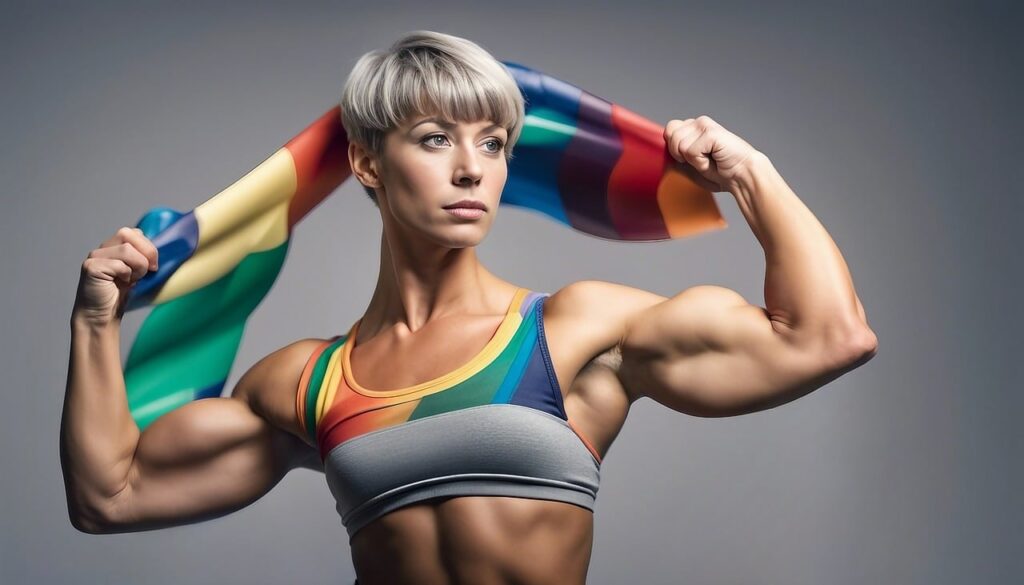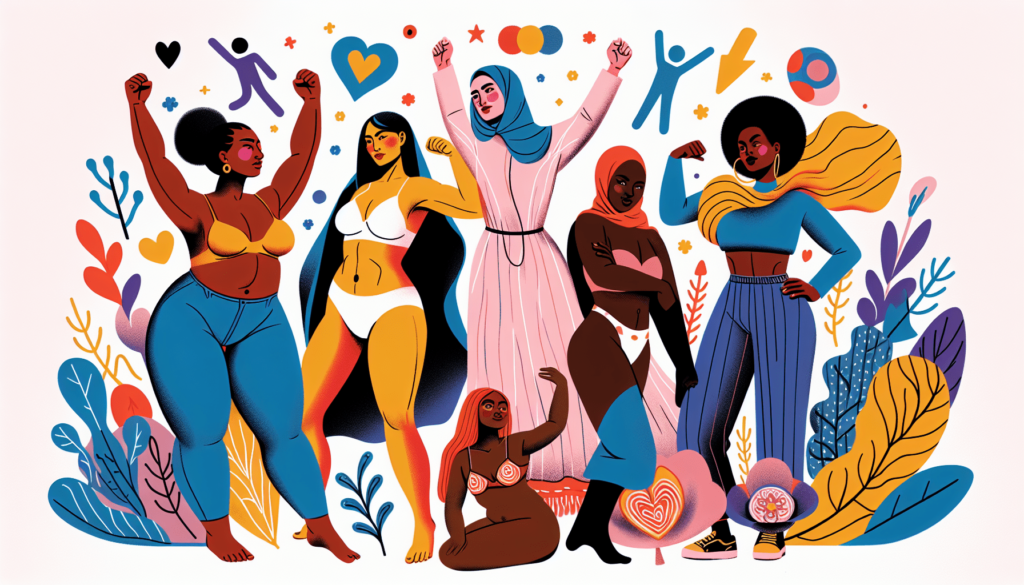In a world that often emphasizes unrealistic beauty standards, it can be challenging to embrace body positivity and resist the pressures of societal expectations. From social media to advertising campaigns, we are bombarded with images that promote an idealized body type, leaving many feeling inadequate and insecure. However, by recognizing the harmful effects of body shaming and striving to cultivate a positive body image, we can empower ourselves and others to celebrate the beauty and diversity of all bodies.

This image is property of pixabay.com.
In This Article
ToggleUnderstanding Societal Pressure
Impact of societal beauty standards
Societal beauty standards have a significant impact on individuals’ self-perception and self-worth. These standards often promote a narrow and unrealistic definition of beauty that can leave many feeling inadequate or constantly striving for an unattainable ideal. The pressure to conform to these standards can adversely affect mental health, leading to feelings of anxiety, depression, and a negative body image.
Media’s role in perpetuating unrealistic body ideals
The media plays a crucial role in perpetuating and amplifying societal beauty standards. Advertisements, television shows, movies, and magazines often showcase a limited range of body types, emphasizing the importance of a slim and “perfect” physique. These images create a false sense of what is normal and desirable, leaving individuals who don’t fit these ideals feeling marginalized and insecure about their bodies.
The influence of social media on body image
In recent years, social media has become a powerful force in shaping societal beauty standards. Platforms like Instagram and Facebook are flooded with curated images of flawless bodies, leading to constant comparisons and a distorted view of reality. Influencers with millions of followers often project a filtered and unrealistic version of themselves, fostering feelings of inadequacy and promoting unhealthy body ideals.
Societal expectations and its effect on body positivity
Societal expectations can heavily influence the way individuals perceive their bodies and their ability to embrace body positivity. Pressure to conform to certain norms, such as having a specific body shape, can create feelings of shame and self-doubt. These expectations can prevent individuals from accepting themselves as they are, hindering their overall well-being and confidence in their own bodies.
The Negative Effects of Body Shaming
Psychological consequences of body shaming
Body shaming can have profound psychological consequences on individuals. Constant criticism or ridicule of one’s physical appearance can lead to low self-esteem, negative body image, and even the development of mental health disorders such as anxiety and depression. The emotional impact of body shaming can be long-lasting, affecting various aspects of an individual’s life, including relationships, career, and overall happiness.
Body shaming and its impact on self-esteem
Body shaming can significantly diminish an individual’s self-esteem. The negative comments and judgments can create a never-ending cycle of self-criticism and insecurity. When one’s appearance becomes the sole focus of worth and value, it can be challenging to develop a positive self-image and cultivate a sense of self-worth independent of physical attributes.
Development of disordered eating and unhealthy habits
Body shaming can contribute to the development of disordered eating patterns and unhealthy habits. Constant criticism and pressure to conform to certain body ideals can lead to extreme dieting, binge eating, or even the development of eating disorders. These harmful behaviors not only have severe physical consequences but also further perpetuate a negative body image and overall dissatisfaction with one’s appearance.
Societal discrimination and marginalization
Body shaming can also contribute to societal discrimination and marginalization. Those who do not adhere to prevailing beauty standards may face prejudice, stereotypes, and limited opportunities due to their appearance. This discrimination not only affects individuals on a personal level but also perpetuates harmful societal norms, leading to a culture that values conformity over diversity and inclusivity.
Promoting Body Positivity
Understanding body positivity and its importance
Body positivity is an empowering movement that aims to challenge societal beauty standards and promote self-acceptance and self-love. It encourages individuals to embrace their bodies at any shape, size, or appearance, and recognizes that true beauty lies in diversity and individuality. Body positivity promotes a shift in focus from external appearance to overall well-being and encourages individuals to value themselves beyond physical attributes.
Challenging negative body stereotypes
Challenging negative body stereotypes is a crucial step in promoting body positivity. This involves challenging and redefining what society deems as beautiful or desirable. By embracing and celebrating diverse body types, shapes, sizes, and abilities, we can challenge the narrow ideals that have been ingrained in our culture. By dismantling these stereotypes, we create a more inclusive and accepting society that celebrates and uplifts all bodies.
Promoting diversity and inclusivity in media and advertising
Media and advertising play a significant role in shaping societal beauty standards. By promoting diversity and inclusivity in these platforms, we can help reshape societal norms and create a more representative and inclusive media landscape. This includes featuring individuals of all body types, races, ages, and abilities in advertisements, television shows, movies, and magazines. By showcasing a broader range of bodies, we can help individuals feel seen and valued.
Educating individuals on body acceptance and self-love
Education is key in promoting body positivity. By providing individuals with information and resources on body acceptance and self-love, we can help them develop a healthy relationship with their bodies. This education can include workshops, talks, and campaigns focused on body positivity, self-esteem, and media literacy. By arming individuals with knowledge and tools, we empower them to challenge societal pressure and embrace their bodies with love and acceptance.
Building a Positive Body Image
Shifting focus from appearance to health and well-being
To build a positive body image, it’s important to shift our focus from appearance to health and well-being. Instead of fixating on what our bodies look like, we can redirect our attention to how they feel and function. Engaging in activities that promote physical and mental well-being, such as regular exercise, mindful eating, and self-care, can help us form a positive and holistic perspective of our bodies.
Embracing individuality and uniqueness
Each person’s body is unique and should be celebrated as such. By embracing our individuality, we can break free from societal expectations and find joy in our own uniqueness. Recognizing and appreciating the qualities that make us different can go a long way in fostering a positive body image and self-acceptance. Embracing our quirks, imperfections, and attributes helps us celebrate the richness of our own bodies and all they have to offer.
Practicing self-care and self-compassion
Self-care and self-compassion are essential components of building a positive body image. Taking care of our bodies and minds by engaging in activities that bring us joy, comfort, and relaxation can foster a deep sense of self-connection and appreciation. Nurturing a kind and compassionate inner dialogue and treating ourselves with love and respect allows us to cultivate a positive relationship with our bodies.
Surrounding oneself with positive influences
The people we surround ourselves with can have a significant impact on our body image and self-esteem. It’s important to seek out and surround ourselves with individuals who promote body positivity and celebrate diversity. Building a support network of friends, family, and communities who uplift and empower us can provide a safe space to explore and embrace our bodies, free from judgment and negativity.

This image is property of pixabay.com.
Overcoming Negative Self-Talk
Identifying and challenging negative self-talk
Negative self-talk can be damaging to our self-esteem and body image. It’s important to identify and challenge these negative thoughts when they arise. By becoming aware of our internal dialogue and questioning the validity of negative beliefs, we can start to replace them with more positive and affirming thoughts. Recognizing that our worth extends beyond our physical appearance is a valuable step towards building a healthier self-image.
Replacing negative thoughts with positive affirmations
Replacing negative thoughts with positive affirmations can help shift our perspective and cultivate a more positive body image. By consciously choosing to focus on our strengths, accomplishments, and qualities unrelated to our appearance, we can reframe our self-perception and build a stronger sense of self-worth. Regularly reminding ourselves of our inherent value can help counteract the negative self-talk that often accompanies body shaming.
Seeking support from loved ones and professionals
Seeking support from loved ones and professionals can provide the necessary guidance and encouragement in overcoming negative self-talk. Talking openly about our struggles and seeking validation from those who care about us can help challenge the distorted self-perception caused by societal pressure and body shaming. Additionally, seeking therapy or counseling from trained professionals can provide valuable tools and techniques to reframe negative thoughts and build a positive body image.
Developing a growth mindset and self-acceptance
Developing a growth mindset and practicing self-acceptance are vital in overcoming negative self-talk. Embracing the belief that we can grow, change, and evolve beyond societal expectations allows us to break free from the limitations imposed by body shaming. Accepting ourselves as we are in the present moment, without judgment or criticism, fosters self-compassion and paves the way for genuine self-acceptance and personal growth.
Healthy Perspectives on Health and Fitness
Promoting holistic health over appearance
Moving towards a healthy perspective on health and fitness involves prioritizing holistic well-being over external appearance. Instead of pursuing a specific body shape or size, we can focus on nourishing our bodies with wholesome foods, engaging in regular physical activity, and nurturing our mental and emotional health. This shift allows us to embrace the concept of body positivity by recognizing that health is not determined solely by how our bodies look, but rather by how they function and feel.
Understanding that health looks different on everyone
Health is not a one-size-fits-all concept. Understanding that health looks different on everyone is crucial in promoting body positivity. Our bodies have unique needs, and our health journeys may differ greatly from one another. By accepting and embracing our individualized approaches to health, we can break free from comparison and judgment, fostering a positive and inclusive perspective on well-being.
Focusing on sustainable and enjoyable physical activities
Physical activity should be approached with a focus on sustainability and enjoyment rather than as a means to achieve a specific appearance. Engaging in activities that we genuinely enjoy and that bring us pleasure can cultivate a positive relationship with our bodies and exercise. Embracing a variety of physical activities that suit our interests and abilities allows us to view movement as a source of joy and self-care, rather than as a punishment or a means of controlling our bodies.
Debunking diet culture and embracing intuitive eating
Debunking diet culture is essential in developing a healthy perspective on health and fitness. Diets that promote restrictive eating and extreme weight loss often lead to yo-yoing weight, disordered eating patterns, and a negative impact on body image. Embracing intuitive eating, which focuses on listening to our bodies’ hunger and fullness cues and honoring our cravings, can help us reclaim a positive relationship with food and nourish our bodies in a way that supports overall well-being.

This image is property of pixabay.com.
Creating a Supportive Environment
Surrounding oneself with body-positive individuals
Surrounding oneself with body-positive individuals can significantly impact our ability to build a positive body image. Being in the company of friends, family, and communities who promote body positivity and accept us for who we are can create a supportive environment for self-acceptance and growth. Positive relationships can help counteract the negative influence of societal pressure and body shaming, allowing us to thrive in an environment that fosters love, acceptance, and empowerment.
Educating friends and family on body positivity
Educating friends and family on body positivity is crucial in creating a supportive environment. Open discussions and gentle conversations about the harmful effects of body shaming and the importance of embracing diverse body types can help challenge ingrained beliefs and promote acceptance. By sharing knowledge and resources with loved ones, we can foster a greater understanding and empathy towards those who may be struggling with body image issues.
Addressing body shaming comments and behaviors
Addressing body shaming comments and behaviors is critical in creating a supportive environment. By challenging harmful remarks or actions that perpetuate negative body image, we can actively combat body shaming and promote a culture of acceptance and inclusivity. Engaging in respectful conversations and providing education around body positivity can help shift perspectives and encourage others to reconsider their language and behaviors.
Creating inclusive spaces and advocating against discrimination
Creating inclusive spaces and advocating against discrimination is an essential step in fostering a supportive environment. This can include actively seeking out and participating in organizations, communities, and events that promote body positivity and inclusion. By championing diversity and encouraging others to do the same, we contribute to the creation of a society that celebrates all bodies and rejects discriminatory practices.
Mental Health Support for Body Positivity
Importance of seeking professional help
Seeking professional help is crucial for individuals struggling with body image issues and negative self-perception. Mental health professionals, such as therapists or counselors, can provide a safe and supportive space for individuals to explore and navigate their feelings surrounding their bodies. These professionals can offer valuable tools, coping mechanisms, and therapeutic interventions to help individuals cultivate body positivity and address underlying mental health concerns.
Therapeutic approaches for body image issues
Various therapeutic approaches can be beneficial in addressing body image issues and promoting body positivity. Cognitive-behavioral therapy (CBT) can help individuals identify and challenge negative thought patterns and develop healthier beliefs about their bodies. Acceptance and commitment therapy (ACT) can assist individuals in cultivating self-acceptance and embracing their bodies despite societal pressure. Additionally, body-focused therapies such as body psychotherapy and body image groups can provide a supportive space for individuals to explore and heal their relationship with their bodies.
Cognitive-behavioral strategies for building body positivity
Cognitive-behavioral strategies can be useful in building body positivity. These strategies involve identifying and replacing negative thoughts and beliefs about one’s body with more positive and realistic ones. Engaging in positive self-talk, reframing negative comparisons, and focusing on personal strengths and values can help individuals develop a healthier and more balanced perspective of their bodies. Practicing these strategies regularly can lead to a more positive body image and overall well-being.
Support groups and online communities for empowerment
Support groups and online communities can provide invaluable support and empowerment for individuals navigating body image issues. These spaces offer a sense of belonging and understanding, as individuals can connect with others facing similar challenges. Sharing experiences, providing encouragement, and learning from one another’s journeys can create a powerful network of support that fosters self-acceptance and growth. Online communities, in particular, can provide accessibility and anonymity for individuals seeking support from the comfort of their own homes.

Empowering Others and Promoting Change
Being a role model for body positivity
Being a role model for body positivity can have a profound impact on others. By embracing and celebrating our own bodies, we inspire those around us to do the same. Leading by example, we can encourage others to challenge societal norms, embrace their uniqueness, and cultivate self-acceptance. Through our actions, we demonstrate that all bodies are worthy of love and respect, regardless of their appearance.
Supporting body-positive movements and organizations
Supporting body-positive movements and organizations is a powerful way to promote change and challenge societal pressure. By donating, volunteering, or participating in campaigns and events, we contribute to the collective effort to dismantle harmful beauty standards and promote inclusivity. Amplifying the voices of those leading the charge for body positivity and working together to create a more accepting society will significantly impact future generations.
Using social media for educational and empowering purposes
Social media can be a powerful tool for educational and empowering purposes. By utilizing platforms to spread messages of body positivity, inclusivity, and self-love, we can reach a wide audience and challenge societal beauty standards. Sharing personal stories, resources, and uplifting content can inspire and uplift those who may be struggling with body image issues. Thoughtfully curating our social media feeds to include a diverse range of body types and perspectives can also contribute to a healthier online environment.
Advocating for inclusive policies and representation
Advocating for inclusive policies and representation is crucial in creating systemic change. By actively engaging in conversations and advocating for diversity in media, advertising, and other influential spaces, we can push for a more accurate and inclusive representation of all bodies. Lobbying for policies that protect individuals from discrimination based on appearance and promoting equal opportunities for all body types helps to challenge societal beauty standards and create a more equitable society.
Conclusion
Embracing body positivity is essential in overcoming societal pressure and body shaming. By understanding the impact of societal beauty standards and media’s role in perpetuating unrealistic body ideals, we can begin to challenge and dismantle these harmful norms. By promoting body positivity, educating others, and building a positive body image through self-acceptance and self-care, we can create a supportive environment that celebrates diversity and empowers individuals. Seeking professional mental health support, promoting healthy perspectives on health and fitness, and advocating for inclusive policies and representation are additional steps we can take to promote positive change in ourselves and society. By continuing the journey towards self-acceptance and empowerment, we can break free from the constraints of societal pressure and build a world where all bodies are valued and celebrated.
Related posts:
 120pcs Acupuncture Ear Seeds Kit for Weight Loss, Dark Circles Removal and Ear Pressure Relief
120pcs Acupuncture Ear Seeds Kit for Weight Loss, Dark Circles Removal and Ear Pressure Relief
 Overcoming the Stigma: Empowering Women with Diabetes
Overcoming the Stigma: Empowering Women with Diabetes
 Cherry Blast Yummy Sports K-Energy Drink: Fuel Your Body with BHB MCT and Caffeine for Enhanced Energy, Focus, and Performance – 30 Servings, 210g – Keto-Friendly Sports Supplement
Cherry Blast Yummy Sports K-Energy Drink: Fuel Your Body with BHB MCT and Caffeine for Enhanced Energy, Focus, and Performance – 30 Servings, 210g – Keto-Friendly Sports Supplement
 Sweat It Out with Our Sauna Pants: The Ultimate Body Shaping Workout Leggings for Women
Sweat It Out with Our Sauna Pants: The Ultimate Body Shaping Workout Leggings for Women
 Luxurious Postpartum Support Belly Band for Women – Waist Trainer for Abdominal Support, Pregnancy, Weight Loss, and Body Shaping (Size L)
Luxurious Postpartum Support Belly Band for Women – Waist Trainer for Abdominal Support, Pregnancy, Weight Loss, and Body Shaping (Size L)
 Slimmer Body Shaper High Waist Sauna Pants for Women with Pocket for Workout and Running
Slimmer Body Shaper High Waist Sauna Pants for Women with Pocket for Workout and Running











No comment yet, add your voice below!